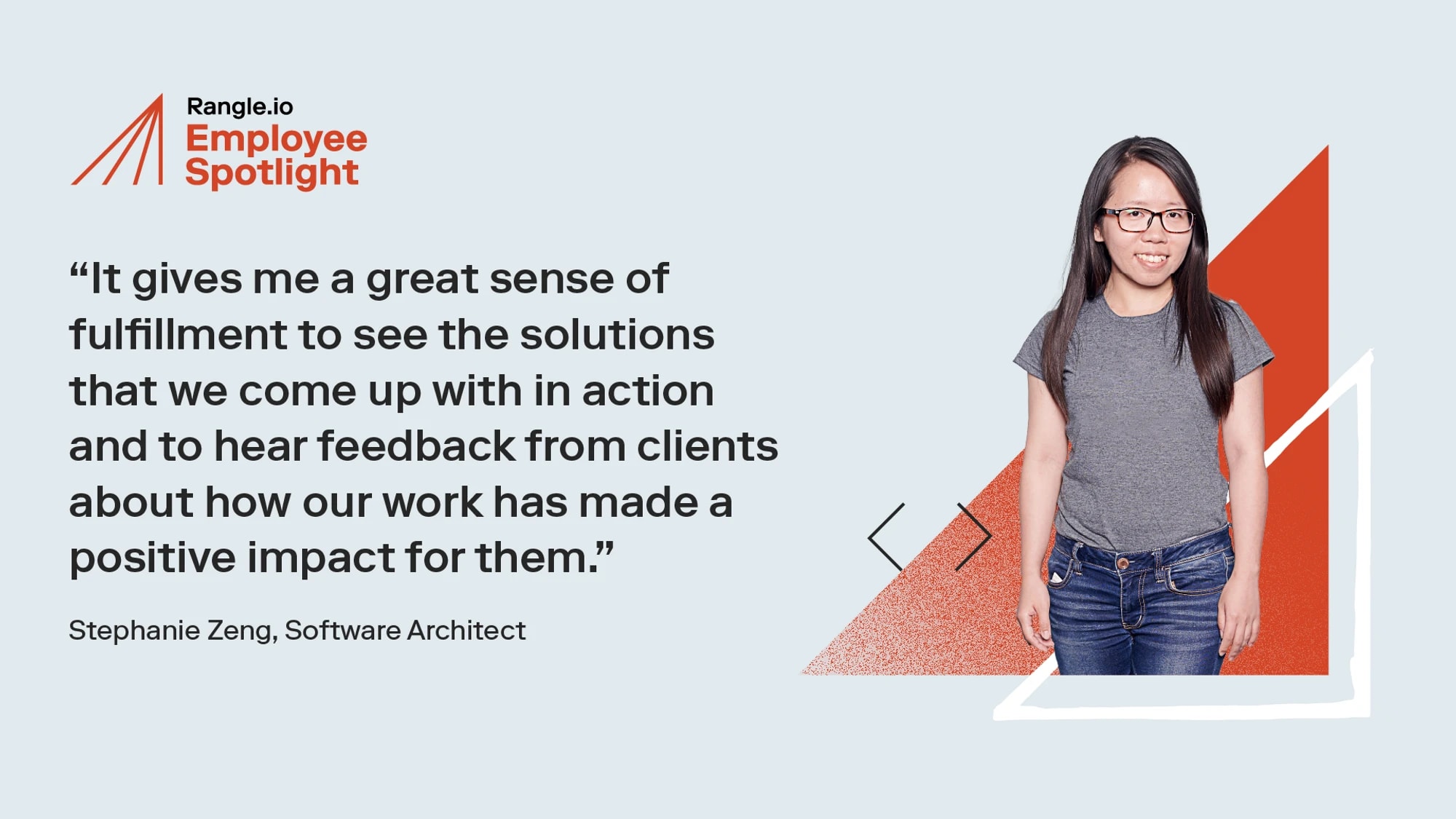For this month’s Rangle Employee Spotlight, meet Jas Der, Agile Delivery Manager at Rangle. They have been with the company since July 2022, empowering teams to solve problems together while assessing situations, risks, and impact.
What path got you to where you are today?
Like many people in the tech industry, I have a bit of a convoluted path to the industry and to this role. My first career was in book publishing, mostly working on ebooks – conversion, distribution, publisher support, and digital asset management. I truly loved being part of the Canadian book publishing industry but found myself eyeing job descriptions and companies outside of that sphere.
I took the leap to quit my job and enroll in a full-time web development boot camp to learn how to code. I was keen to learn new skills for a rapidly growing industry and was excited by the prospect of calling myself a developer one day, even though I hardly knew what that might look like other than “making a website.”
Except – I was really bad at coding. No exaggeration. It simply didn’t come naturally to me the way it did to others in my program. Truthfully, it was an incredibly humbling experience to be absolutely terrible at something. I had to check my pride and accept that this was a craft I didn’t have a natural aptitude for. But that boot camp wasn’t just about writing code. I learned a lot of fundamentals about web app development, the software development lifecycle, data structures, version control, testing, and more.
I ended up landing my first job in tech as a junior QA analyst. Turns out, to no surprise, I was very good at finding ways to break applications! Creative and critical thinking and empathy for a potential user of an app enabled me to increase test case coverage. As best as I could, I accounted for edge cases and logged every bug, discrepancy, and defect. Even as a non-developer, I was still very much immersed in the code and inner workings of our products. Being part of a cross-functional scrum team gave me access to the different roles and functions – a great bird’s eye view of the product development process. I think this holistic perspective sets me up well for the next phase of my career as a delivery manager.
If you had to pick one skill that will help make a delivery manager successful at Rangle, what would it be?
- Strong communication. It's a term seen in every job description, but what does it actually look like for a delivery manager?
- Adaptive communication – Adjust how you speak or write about something based on who you communicate with. Someone on your team may want as much detail as possible about a topic; another person may just need the tl; dr. Equally important is knowing when not to speak.
- Don’t be afraid to repeat yourself. I guarantee the first time you share important information with a group of people, someone will miss it, forget it, or maybe someone happens to be absent that day. If it’s important, it deserves repeating. Like dessert at the buffet. Or movie theatre popcorn.
- Listen. I’m not a highly technical ADM, but I work with technical people and need to be able to follow the conversation well enough to do my job. Pay attention to the main thread of conversation even if you don’t know what the jargon means.
If scoobadoop isn’t going to work, then we can try wollythumping, but it takes a long time. The alternative would be thumpywolling, but that’s definitely riskier since the doodad isn’t thlerped enough to be wolled and I don’t know how to thlerp.
No idea what those terms might mean! But you know enough to ask follow-up questions: Does wollythumping have other risks other than taking a long time? What are they, and how do they compare to thumpywolling? If thumpywolling is the better option, how do we get the doodad in a place where it is thlerped enough? What does “enough'' mean? Who can I get in touch with to help with that? Actually, do we even need scoobadoop in the first place?
Now I have an idea of a few possible solutions the developers are considering, how each might affect the delivery timeline, and what risks to keep an eye on. I can also get in touch with other departments to ask for support. A delivery manager doesn’t need to solve every problem. They need to be aware of the situation, risks, and impacts, and then connect the dots and empower the team to solve the problem together. - How you format written communication matters. Make it easy for the reader to get the information you’re sharing. For example, maybe a wall of text in Slack isn’t the best way to share a list of priorities.
- Don’t be afraid to repeat yourself. Chances are, at least one person may have misheard you the first or second time. (See what I did there?)
- Be inclusive and mindful. As a facilitator, I am responsible for fostering a safe and productive environment. Inclusive communication can be overt, like not using discriminatory language. And it can be more subtle, like ending the use of insidious terms so commonplace we fail to consider their harmful origins.
What advice would you give other people looking to move into a delivery role?
Don’t discount your skills, experience, and strengths from previous employment, education, volunteering, or hobbies. Everything you’ve done in your life has taught you something, and that collection of experiences can be leveraged in your job. Delivery management isn’t just executing a product roadmap or selecting a delivery framework, or meeting deadlines. The work needs so-called “soft skills,” and those skills can be acquired in all areas of our life and adapted to suit the needs of the client and project. Knowing the fundamentals of the software development lifecycle and popular frameworks is important, but a creative take, style, and adoption (or rejection!) of the basics are what will add value to your team and the product you’re building.
What are some of your hobbies or interests outside of work?
I play the drums in a pop punk band; I recently discovered an interest in silversmithing and lost wax casting, and I’m starting to get into (indoor) rock climbing.
Are you looking for your next career move in tech? Visit our careers page to explore current job openings, learn more about our company culture, and find your place at Rangle.


